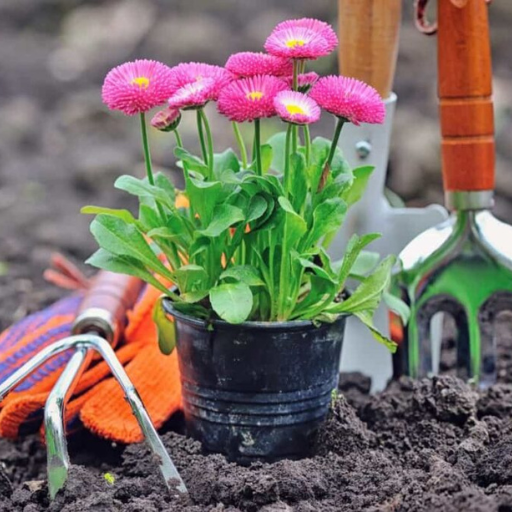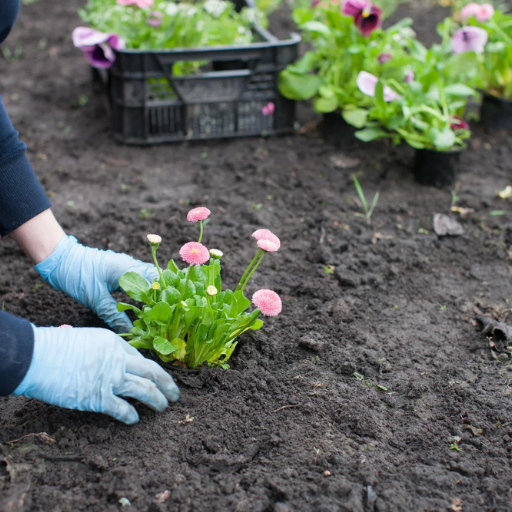Maintaining vibrant and healthy flowering plants requires more than just sunlight and water; the right nutrients are essential to support their growth and blooming potential. In this blog, we will explore some of the best organic bloom fertilizers available on the market to help your plants thrive. Organic fertilizers not only promote sustainable gardening but also enrich the soil without the harmful chemicals often found in conventional products. Whether you’re a seasoned gardener or a novice horticulturist, our comprehensive guide will provide you with valuable insights into choosing the best organic fertilizers to enhance your garden’s floral display.
What Makes Organic Bloom Fertilizer the Best Choice for Your Plants?

Understanding Organic Ingredients in Bloom Fertilizers
Organic bloom fertilizers are composed of natural ingredients that provide necessary nutrients without making use of artificial compounds. Compost, bone meal, blood meal, fish emulsion and kelp extract are some of the main ingredients. They give a balanced nutrient profle through the supply of nitrogen, phosphorus and potassium as well as trace elements and beneficial microbes. This way, farmers are advised to embrace this ecological approach because it encourages strong plant growth and blooming while improving soil quality and diversity. Further still, organic fertilizers reduce chemical runoff risks and are friendly to pets or even helpful insects.
How Nutrient-Rich Soil Improves Bloom Quality
Nutrient-rich soil is essential for vibrant healthy blooms in flowering plants. Nitrogen for dense leaves; phosphorous for roots which can sustain more flowers; potassium to generally make them healthier against diseases. Well balanced soil with nutrients is responsible for continuous nutrition to brighter flowers that cover a larger area. Furthermore, rich soils containing organic matter become friable hence allowing air circulation besides increasing water holding capacity. Moreover, fertile soils enhance a flourishing microbial community that aids in delivering nutrients as well as preventing infections leading to tougher blooms with vibrant colours. Thus, one must invest in nutrient-rich soils when seeking high flower production from their garden.
Benefits of Using Organic Bloom Boosters
For gardeners looking forward to having better quality and quantity of their plants’ flowers there exist numerous advantages associated with organic bloom boosters. These naturally derived enhancers have been proven over time by enhancing microbial activity within the structure of the soil thereby promoting better blooms What they do is provide vital NPK nutrients gradually rather than burning crops like many other chemicals would do during application thereby reducing chemical burns on plants such as nitrogen phosporous potassium & reducing stress on crops by which promotes root growth Besides this they pose no threats to beneficial insects while adversely affecting ecosystems through pollution Finally these substances also contain humic acids and beneficial microorganisms which make the plants able to take more nutrients and generally enhance their physical condition leading to more colourful prolific blooms.
How to Choose the Right Organic Bloom Fertilizer?
Synonyms to Consider While Choosing Fertilizers
While picking the right organic bloom fertilizer, it is important to consider some factors that will ensure optimal plant health and bloom production:
- Nutrient Make-up: Look for fertilizers that provide a mix of essential nutrients, particularly nitrogen (N), phosphorus (P), and potassium (K). For flower development, phosphorous is very important; just make sure it is there.
- Soil State: Knowing the current nutrient status and pH level of your soil helps you in selecting a fertilizer that will complement and correct any deficiencies. Soil testing kits are available to determine what your soil lacks and guide your fertilizer choice.
- Kind of Plants: Different plants have different nutritional needs. Some may need more acidic soils while others thrive well in neutral conditions. Choose your fertilizer according to the specific requirements of the plants you are cultivating.
- Rate of Release: Organic fertilizers take longer than their synthetic counterparts before they can release nutrients into the soil. But within organic alternative also there are differences between how fast this happens. Opt for products which offer constant, long-term supply so as to feed throughout the growing season.
- Environmental Impact: Think about the environmental impact of the said fertilizers. This less harmful way from water pollution perspective by use of natural substances allows avoiding damage of soils and other eco-systems where these toxic forms come out at once or indirectly through them meaning that one should seek such labels like OMRI listed produce.
By evaluating these factors, you can make an informed choice that supports robust and vibrant blooms while maintaining a healthy, sustainable garden environment.
The Role Played By Potassium In Organic Bloom Fertilizers
Potassium plays an important role in producing strong flowers in one’s garden. This vital mineral boosts overall plant vigor making them resist diseases better as well as increase their water-use efficiency by reducing transpiration rates. It enables synthesis of proteins together with carbohydrates which play crucial roles in growth maintenance including reserve. Additionally, it ensures the optimum opening and closing of stomata to minimize water loss while optimizing photosynthesis that occurs through exchange of respiratory gases in leaves. In organic bloom fertilizers, potassium usually comes from natural sources like kelp meal, wood ash or granite dust thus maintaining a continuous supply of this mineral which is required for healthy vibrant blooms.
Comparison between Organic and Synthetic Fertilizers
When discussing organic vs. synthetic fertilizers, several major differences should be considered:
- Composition: Whereas organic fertilizers are derived from natural sources such as compost, manure and bone meal; synthetic ones are formulated using inorganic chemicals. Although organic fertilizers improve soil structure and increase its capacity to retain moisture and nutrients, synthetic ones provide targeted nutrients quickly but do not support long-term soil health.
- Nutrient Release: Organic fertilizers release nutrients slowly after they decompose thereby resulting into a constant supply of nutrients which improves soil fertility. However, there is immediate nutrient availability with synthetic fertilizers enhancing faster plant growth though has increased risk of leaching away and running off leading to environmental damage.
- Environmental Impact: Due to their less harmful ways ascertained by using natural substances which avoid pollution or damage to the environment caused by toxic forms released at once or indirectly through them meaning that one should look out for such labels like OMRI listed produce.
- Cost and Availability: Frequently, artificial fertilizers are cheaper and more common than the organic choices. But this initial high cost can be overcome by the long term advantages of organic manures e.g. reduced need for chemical inputs and improved soil health.
- Soil Health: Organic fertilizers on the other hand contribute to microbial activity in the soil as well as organic matter that encourages a favorable environment for plants. However, synthetic fertilizers do provide nutrients but do not support long-term health and fertility of soils.
Through knowledge of such disparities, individuals doing gardening may determine whether or not to use natural versus artificial fertilizers based on their particular situations as well as environmental considerations.
What Are the Top Organic Bloom Fertilizer Brands?

Best Organic Bloom Booster Fertilizer Options Reviewed
As regards the Best Organic Bloom Booster Fertilizers brand, three brands emerge as the top performers on the rating charts. Namely; LOYAL, FoxFarm and General Organics.
- LOYAL Organic Bloom Booster: The first thing that strikes you about this product is its quality ingredients which makes it a household name among organic farmers. It provides a balance of nutrients with phosphorus emphasized for good blooming. Not only so but also beneficial soil microbes and mycorrhizae are added to improve nutrient uptake and promote healthy soils. It is considered reliable due to its environmental consciousness, non-GMO ingredients and sustainability measures.
- FoxFarm Big Bloom Liquid Concentrate Fertilizer: Among liquid fertilizers, FoxFarm’s Big Bloom has outstanding efficacy in promoting lovely blooms. Blended from earthworm castings and bat guano known for their rich nutrient profiles, this organic fertilizer ensures immediate nutrient availability while supporting soil microbial activity leading to healthier plants that yield more.
- General Organics – BioThrive Bloom: Among other things, General Organics’ BioThrive Bloom stands out because it has been formulated to provide comprehensive nutrients specifically required by flowering plants. In order to enhance bloom attributes like natural flavor, aroma and color; BioThrive Bloom utilizes some plant-based or mineral based inputs making it vegan-friendly. What has made it popular however is how easy it is to use and can be used with all indoor/outdoor set ups.
These top organic bloom boosters give gardeners options that are environmentally friendly and effective at stimulating abundant flowering and good plant health.
User Testimonials & Expert Opinions
User Testimonials:
- LOYAL Organic Bud & Bloom Fertilizer: “I have been using LOYAL for two seasons now, and the results are amazing! My flowers have never looked better, and the fact that it’s organic makes me feel good about using it in my garden.” – Alice, passionate gardener.
- FoxFarm Big Bloom Liquid Concentrate Fertilizer: “FoxFarm’s Big Bloom gave my roses a dramatic boost. The flowers are more vibrant and plentiful. I appreciate that it’s a liquid concentrate, making it easy to mix and apply.” – Robert, home gardener.
- General Organics – BioThrive Bloom: “BioThrive Bloom worked wonders for my indoor plants. The blooms are more colorful, and the scent seems richer. Plus, being a vegan-friendly option is a huge plus for me.” – Lisa, indoor plant enthusiast.
Expert Opinions:
- LOYAL Organic Bud & Bloom Fertilizer: “Using LOYAL’s product you can be sure that you have employed an environmentally responsible approach towards growing your plants as well as giving them balanced nutrients. Moreover, its inclusion of mycorrhizae has made it ideal for all types of gardeners including new ones.” – Gardening Advisor, Green Thumb Magazine.
- FoxFarm Big Bloom Liquid Concentrate Fertilizer: “You will often see lawns experts recommending FoxFarm’s Big Bloom due to aspects like quick nutrient availability and benefits to soil microbes. It is however different from other liquid fertilizers because it employs naturally occurring ingredients like earthworm castings or bat guano.” – Plant Science Journal.
- General Organics – BioThrive Bloom: “The formula used in the manufacture of BioThrive Bloom has been largely commended since it is complete enough to match the specific needs of flowering plants. This is how the bloom’s look is enhanced by having some botanical or mineral inputs making this vegan friendly product stand out among others. Specialists also highlight its adaptability to diverse gardening situations.” – Botanical Review.
These testimonials and expert opinions illustrate how successful these top organic bloom boosters are enabling customers make informed decisions on what would work best for their flowers.
How Should You Apply Organic Bloom Fertilizer for Best Results?

Application Techniques for Bloom Fertilizers
For organic bloom fertilizers, follow these techniques to get the best results:
- Pre-Watering: Make sure your plants are well-watered before applying any fertilizer. This will help prevent root burn and encourage better absorption of nutrients.
- Correct Dosage: Always follow the recommended dosage indicated on the pack of fertilizers. Overuse can lead to nutrient imbalances and toxicity in your plants.
- Timing: Apply bloom fertilizers during the flowering phase of a plant for optimum outcomes because this stage supports bud and blooms development.
Application Method:
- Liquid Concentrates: For liquid fertilizers, like FoxFarm Big Bloom, dilute as directed and pour directly onto the soil ensuring that it is reaching down to the roots.
- Granular Fertilizers: In case of products such as LOYAL Organic Bud & Bloom, sprinkle them at the base of plant and mix with soil gently while avoiding excessive compaction
- Foliar Feeding: General Organics BioThrive Bloom is an example where some fertilizers can be used as foliar sprays. Prepare according to instructions and spray evenly over leaves allowing for direct absorption of nutrients.
- Frequency: Apply it in line with manufacturer’s recommended intervals. Regular feeding without overdoing ensures nutrients availability is continuous but does not stress the plant.
You can improve on how efficient your organic bloom fertilizer works by following such application techniques leading to strong vibrant blossoms.
Optimal Frequency and Timing for Fertilizer Use
The ideal frequency or timing for using organic bloom fertilizers play a vital role in achieving healthy flourishing flowers. Many experts recommend feeding plants every 1-2 weeks during blooming. Start fertilizing at first sign of budding until flowers start fading off there after. It is better if you apply it early morning since lower temperatures minimize chances of burning with fertilizer yet promotes increased nutrient uptake . Depending on individual needs determine how frequent you need to apply based on the specific requirements of your plants and the type of fertilizer you are using, just make sure you follow the instructions provided by the manufacturer.
Common Mistakes to Avoid When Applying Fertilizers
- Over-fertilizing: Adding too much fertilizer is one mistake that is often made. This can result in nutrient burn, damage to roots or even death of plant. Observe manufacturer’s recommended dosages and look out for signs of over-fertilization in your crops.
- Incorrect Timing: Poor timing can lead to low nutrient uptake by plants and wasted products. For instance avoid fertilizing during hot times or when plants are stressed. Therefore early morning hours are quite good.
- Ignoring Soil Conditions: You may end up applying unneeded fertilizers because you don’t know about the nutrient level of your soil. Conduct soil tests for determination of its exact needs before adjusting your fertilizer application routine accordingly.
- Using the Wrong Type of Fertilizer: Different plants have different nutritional requirements. Inappropriately using a fertilizer on some farms leads to either little or more supply nutrients than what they need. Get a product customized for your crops’ needs.
- Poor Application Techniques: Uneven growth and deficiency in nutrients can occur as a result of poor application techniques including unevenness in distribution and incorporation into soil or not following instructions given on how to apply these products as mentioned above.
Why is Organic Matter Important for Bloom Fertilizers?

Compost and Manure’s Role in Organic Farming
In organic farming, compost and manure are pivotal since they provide plants with natural and sustainable supply of nutrients. Compost is decomposed organic matter that improves soil structure, enhances the retention of moisture and increases the activities of microorganisms within soils. Similarly, manures which are derived from animal waste, have high contents of essential nutrients like Nitrogen (N), Phosphorous (P) and Potassium (K) which are vital for plant growth. When we use composts and manures we not only recycle organic waste but also enhance a more balanced fertile soil ecosystem. The latter supports better crops and improved yields without reliance on synthetic chemicals.
Benefits of Seaweed and Kelp as Organic Additives
Based on my own experience, seaweed/kelp has been an extremely effective organically additive for bloom fertilizers. These marine plants contain important minerals, vitamins as well as growth hormones that facilitate strong development in plants. Seaweed/Kelp extracts promote root growth so that stress tolerance is higher while overall plant health is bettered. They also have alginic acid whereby it will improve soil structure besides water-holding capacity too. I have found out that when I use seaweed/kelp, my blooms become stronger healthier while there is great increase in yield in my garden without using artificial fertilizers.
How Bone Meal and Guano Contribute to Plant Nutrition
For my organic gardening practices, bone meal and guano have proved to be excellent contributors to plant nutrition.Bone meal is made by grinding up animal bones which are rich sources of phosphorus (P) as well as calcium elements.P is very necessary for root establishment plus flowering while Ca often contributes towards cell wall fitness in addition to expansion into tissues.I have noticed that after putting bone meal into my planting media it results into larger flowers with stronger stems.Guano however refers to the accumulated excrement of seabirds or bats and it is another strong organic amendment whose high NPK content is significant for various stages of plant growth ranging from vegetative to the flowering/fruiting. Upon application, guano has greatly increased the nutrient richness in my soil leading better condition for my plants as well as higher yields.
Frequently Asked Questions (FAQs)

Q: Which is the most effective organic bloom fertilizer for a flowering plant?
A: The best boosters of blooming fertilizers for flowering plants are those that contain balanced NPK ratios, essential amino acids and plant nutrients. Organic products with substances such as seaweed extract and rock phosphate are much preferred.
Q: How can I make my plants flower more using plant food?
A: Making your plants flower more by use of plant food involves ensuring it has high contents of phosphorous and potassium, which are vital in the flowering and fruiting stages. This nutrient combination promotes blossoms and fruits.
Q: What are the essential nutrients needed by plants to achieve optimal flower production and good fruiting?
A: For optimal flower production and good fruiting, critical plant nutrients include Nitrogen, Phosphorus, Potassium, Magnesium, Sulfur as well as a broad array of trace elements. These nutrients help in energy absorption and utilization purposes.
Q: Can I utilize organic bloom fertilizers in hydroponics?
A: Yes, one can use organic bloom fertilizers in hydroponics. Thusly labeled OMRI certified products ensure that they meet organic standards for safety when used in hydroponic growing environments.
Q: How much should I apply of the best bloom booster fertilizer?
A: Application amounts will differ depending on brand name or concentration. Usually they’re measured per gallon of water to specific kinds of plants. Always consult product label for correct dosage.
Q: How does nitrogen amount affect flowering/fruiting phases?
A: It is thus important to closely monitor nitrogen amounts during flowering/fruiting stages. Too much nitrogen may cause lush veg growth but reduce bloom. Balanced NPK with lower N but higher P&K is ideal.






